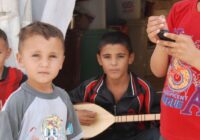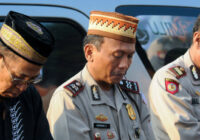With mosques under increasing surveillance, the Islamic State has identified soccer as a recruiting ground.
Abu Otaiba, the nom du guerre of a self-taught imam and Islamic State (IS) recruiter in Jordan, uses soccer to attract recruits.
“We take them to farms, or private homes. There we discuss and we organize soccer games to bring them closer to us,” Abu Otaiba told The Wall Street Journal in a recent interview.
Abu Otaiba said he was recruiting outside of mosques because they “are filled with intelligence officials.” Mosques serve him these days as a venue to identify potential recruits whom he approaches elsewhere.
A similar development is evident in Jordanian universities, where sports clubs and dormitories have become favored IS hunting grounds because they so far don’t figure prominently on Jordanian intelligence’s radar.
ISIS and Soccer
The Islamic State’s use of soccer reflects anthropologist Scott Atran’s observation that suicide bombers often emerge from groups with an action-oriented activity. It is also symptomatic of jihadists’ convoluted relationship to a sport that they, on the one hand, view as an invention of infidels designed to distract the faithful from their religious obligations and, on the other hand, see as a useful tool to draw in new recruits.
Attitudes toward soccer are complicated by the fact that many jihadist and militant Islamist leaders are either former players or soccer fans. Abu Bakr al-Baghdadi, the Islamic State’s caliph, was a fervent soccer player while in a US prison in Iraq where he earned the nickname “Maradona” after Argentine superstar Diego Maradona.
Osama bin Laden was believed to be an Arsenal Football Club fan who had his own mini World Cup during the war against the Soviets in Afghanistan in the 1980s. Teams formed by foreign fighters based on nationality played against one another in downtime. While in exile in Sudan, bin Laden had two squads that trained three times a week and played on Fridays after midday prayers.
Hassan Nasrallah’s Hezbollah manages clubs in Lebanon, while Hamas’ Ismail Haniyeh, a former player, has organized tournaments in Gaza.
An online review conducted in 2014 by Vocativ of jihadist and militant Islamist Facebook pages showed that their owners were often soccer fans. However, jihadist empathy for the sport does not stop them from targeting local games in a geography stretching from Iraq to Nigeria, as well as big ticket European and World Cup matches whose live broadcasts hold out the promise of a worldwide audience.
An IS suicide bomber blew himself up in March in a soccer stadium south of the Iraqi capital, killing 29 people and wounding 60. The bomber chose a match at a small stadium in the city of Iskandariya, 30 miles from Baghdad.
The London-based Quilliam Foundation reported at around the same time that boys in IS military training were instructed to kick decapitated heads as soccer balls.
In July, crowds in Islamic State’s Syrian capital of Raqqa were forced to attend the public execution of four players of the city’s disbanded Al Shabab SC soccer team—Osama Abu Kuwait, Ihsan al-Shuwaikh, Nehad al-Hussein and Ahmed Ahawakh—on charges that they had been spies for the People’s Protection Units (YPG), a Syrian Kurdish militia that is on the frontline of confronting IS on the ground in Syria.
“Jihad Olympics”
Yet with IS under increased military pressure in Syria and Iraq, the group—desperate to project a degree of normalcy in areas it still controls—appears to be turning to sports and soccer, in particular. Breaking with its past that was muddled with the banning of soccer despite its use of the sport as a recruiting tool, IS has urged boys in various towns, including Raqqa in Syria and Mosul and Tal Afar in Iraq, to participate in what it dubs the “Jihad Olympics.”
Boys, despite a ban on soccer jerseys and the execution of 13 children in early 2015 for watching an Asian Cup match on television, play soccer or a tug of war during the events and are awarded sweets and balloons if their team is victorious. The boys’ families are invited to watch the games.
IS appears to have been struggling with the notion of using soccer as a way of placating its population and projecting normalcy for some time. The group authorized the showing of the FC Barcelona and Real Madrid derby a week after the Paris attacks in November 2015 that targeted a major soccer match among others, but at kick-off rescinded the permission and closed down cafes and venues broadcasting the match due to a minute’s silence at the beginning of the game at the Santiago Bernabéu Stadium in honor of the victims of the attacks in the French capital.
A precursor to the “Jihad Olympics” was an exemption of children from the ban on soccer as well as video clips showing fighters in a town square kicking a ball with kids. Confusion within the group about its policy toward soccer is reflected in the fact that age limits for the exemption vary from town to town. In Manbij, a town near Aleppo recently conquered by US-backed militias, children older than 12 were forbidden to play the game, while in Raqqa and Deir ez-Zor in eastern Syria the age limit is believed to be 15.
Similarly, foreign fighters have been allowed to own decoders for sports channels and watch matches in the privacy of their homes.
“IS policy towards soccer is driven by opportunism and impulse. The group fundamentally despises the game, yet can’t deny that it is popular in its ranks and in territory it governs,” said a former Raqqa resident.
The views expressed in this article are the author’s own and do not necessarily reflect Fair Observer’s editorial policy.
Photo Credit: Goir
 We bring you perspectives from around the world. Help us to inform and educate. Your donation is tax-deductible. Join over 400 people to become a donor or you could choose to be a sponsor.
We bring you perspectives from around the world. Help us to inform and educate. Your donation is tax-deductible. Join over 400 people to become a donor or you could choose to be a sponsor.
Support Fair Observer
We rely on your support for our independence, diversity and quality.
For more than 10 years, Fair Observer has been free, fair and independent. No billionaire owns us, no advertisers control us. We are a reader-supported nonprofit. Unlike many other publications, we keep our content free for readers regardless of where they live or whether they can afford to pay. We have no paywalls and no ads.
In the post-truth era of fake news, echo chambers and filter bubbles, we publish a plurality of perspectives from around the world. Anyone can publish with us, but everyone goes through a rigorous editorial process. So, you get fact-checked, well-reasoned content instead of noise.
We publish 2,500+ voices from 90+ countries. We also conduct education and training programs
on subjects ranging from digital media and journalism to writing and critical thinking. This
doesn’t come cheap. Servers, editors, trainers and web developers cost
money.
Please consider supporting us on a regular basis as a recurring donor or a
sustaining member.
Will you support FO’s journalism?
We rely on your support for our independence, diversity and quality.






